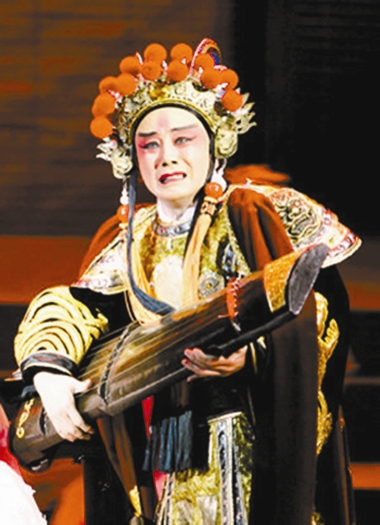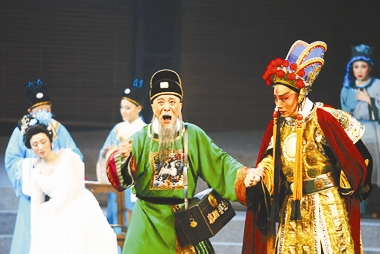

Meng Guanglu as Zheng He in “Zheng He’s Voyages of Discovery.”EIJING opera, a form of traditional Chinese theater which combines music, vocal performances, dancing and acrobatics, was taken into the spotlight when it was included in the UNESCO intangible world heritage list late last year. Since then, changes have taken place in an unexpected direction.
With crossover productions taking on other forms of the art and the integration between different schools of Beijing opera, new life seems to have been injected into the old art.
The National Center for the Performing Arts announced last week that it had commissioned film director Zhang Yimou to direct a Beijing opera entitled “Spring and Autumn.” The show will premiere this December to mark the theater’s fourth anniversary.
A new production, “Zheng He’s Voyages of Discovery” by Tianjin’s youth Beijing opera house, uses a multimedia backdrop and a life-size boat to bring a cinematic impact to the stage. A symphony orchestra provides the music.
Starring Meng Guanglu, a well-known singer of the Qiu School, the show incorporates Southeast Asian songs and dances as well as Chinese folk song “Jasmine Flower.” There were also humorous scenes with sailors playing mahjong, actors posing as mahjong tiles flip and roll on the stage. When the show debuted at Shanghai Grand Theater, the audiences were stunned.
“Both the script and music for ‘Zheng He’ are masterpieces,” said Meng. “Innovation in Beijing opera has to be well-grounded rather than free improvisation. Those who want to innovate need to cherish a respect for the art.” The actor said he was moved to tears when he sang in certain scenes.
Meanwhile, Shanghai Beijing Opera House presented a Chinese painting version of “Orphan of the Zhao Family,” merging the beauty of Chinese paintings into the choreography and stage set.
Then, Shi Yihong, an actress of the Mei School, broke the barrier between schools and starred in “The Unicorn Purse,” a piece previously exclusively performed by the Cheng School. Cheered by fans as new-concept Beijing opera, the show won a rave review from critic Bai Yansheng. “Shi’s performance was natural and beautiful,” he said.
Other critics pointed out that audiences embraced “Zheng He” and other innovative Beijing operas because the shows had themes closer to them and were presented in a more modern form.
The Beijing opera boom is also supported by theaters. Apart from the National Center for the Performing Arts that commissioned Zhang Yimou with an opera, Shanghai Grand Theater has contributed the whole month of February to Beijing opera. In the past, the theater was reserved for ballet, symphony and other Western art.
“Beijing opera is not just our national treasure; it also belongs to the whole world. Our theater is doing its due share to carry on Chinese culture,” said Zhang Zhe, president of Shanghai Grand Theater.
Mao Shi’an, an art critic based in Shanghai, said there was still room for innovation with Beijing opera. “Can you imagine if we still present the audiences with what Dowager Cixi enjoyed watching? Beijing opera would have died out if it did not change.”
However, other critics warned that people should beware of certain traps in the innovation of Beijing opera. “They should bear in mind that innovation in Beijing opera needs to serve the audience, rather than for purpose of winning certain awards or political propaganda,” said Weng Si, a Shanghai theater reviewer.
(Debra Li)
|

